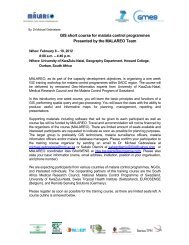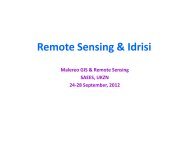Practical Manual - Malareo
Practical Manual - Malareo
Practical Manual - Malareo
You also want an ePaper? Increase the reach of your titles
YUMPU automatically turns print PDFs into web optimized ePapers that Google loves.
It is vital to understand what each field means.<br />
Incidence vs Prevalence<br />
Incidence and prevalence are different statistical measures of disease occurrence. They are often<br />
confused. This section shows you how to calculate both Incidence and prevalence.<br />
Incidence<br />
Incidence is refered to as the risk of becoming ill over a period of time. It measures the chance of being<br />
infected within an area over an extended period of time. It therefore includes time as a measure. So if<br />
we look at the small rural community of Monzi In Northern KwaZulu-Natal the Incidence rate will be the<br />
total number of infections added divided by the Total average population divided by the number of<br />
years of records.<br />
Open the Layer malaria_case-Health_facility. Open the attribute table. You need to find the record for<br />
“Monzi” So type”Monzi” into the “Look for box and select NOTIAREA from the drop down filed selector<br />
and click on Search<br />
You will notice that at the top of the window it notifies you One matching feature is found (1 Matching<br />
features)<br />
To See this record tick the Show selected only box This will show the Monzi Record. This shows only the<br />
requested record. We will use this to calculate both incidence and prevalence.<br />
The following is a simplified method of calculating Incidence.<br />
Incidence needs to take into account how many years the infected individuals contributed to the total<br />
infected population. So to get incidence one multiplies the number of infected by the length of time<br />
they have been infected within the total population So if you look at the data<br />
QGIS for Malaria Page 58




